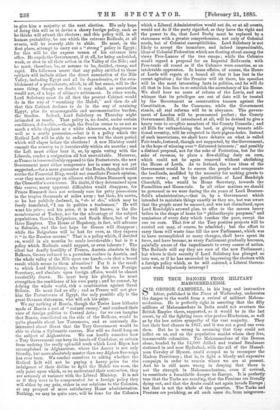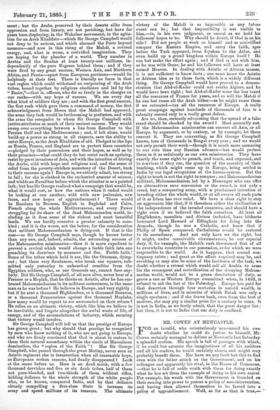THE TRUE DANGER FROM MILITANT MAHOMMEDANISM.
IR GEORGE CAMPBELL, in his long and instructive kJ letter, published in the Times of Wednesday, underrates the danger to the world from a revival of militant Mahommedanism. He is perfectly right in asserting that the fifty millions of Mahommedans in India could not overturn the British Empire there, supported, as it would be in the last resort, by all the fighting races who profess Hindooism, as well as by the less active sympathy of the vast majority. They lost their best chance in 1857, and it was not a good one even then. But he is wrong in assuming that they could not inflict on us, and on the population amidst whom they live, innumerable calamities. The Mahommedans of the Deccan alone, headed by the 14,000 drilled and trained Soudanese stationed in and near Hydrabad, with the aid of the Mussulman Cavalry of Mysore, could compel us to reconquer the Madras Presidency ; that is, to fight a bloody and expensive campaign in order to remain where we are at present. And he is still more wrong in denying that there is not the strength in Mahommedanism, even if revived, to constitute a formidable danger to Europe. It is perfectly. true that the Turks are receding, that the Persians are literally dying out, and that the Arabs could not again invade Europe ; but that is not the whole of the question. The Turks and Persians are perishing, as all such races do, from misgovern
meat ; but the Arabs, preserved by their deserts alike from oppression and from luxury, are not perishing, but have for years been displaying, in the Wahabee movement, in the agitation for an Arab Khalifate—which Sir George Campbell would not deny to be serious, and which alarmed the Porte beyond measure—and now in this rising of the Mandi, a revived energy, and, what is worse, a revivified imagination. They are hoping for the plunder of a world. They number in Arabia and the Soudan at least twenty-one millions, independently of the pure Negroes behind them ; and if they were fired by any great success, Western Asia, and Northern Africa, and Persia—apart from European garrisons—would lie helplessly at their feet. There is literally no force in that vast region which could withstand an outpouring of the Arab tribes, bound together by religious obedience and led by the " Emirs "—that is, officers, who die so freely in the charges on our ranks—with any hope of success. We see every day what kind of soldiers they are ; and with the first great success, the first rush which gave them a command of money, the first acknowledgment from Mecca that the Mandi had appeared, the arms they lack would be forthcoming in profusion, and with the arms the renegades to whom Sir George Campbell with justice attributes so much of their ancient success. They would sweep over everything between a line from Zanzibar to the Persian Gulf and the Mediterranean ; and, if left alone, would build-up a power as strong in all respects, save the ability to enter Europe, as the Arab Khalifates of old. Pledged to the lips as Russia, France, and England are to protect these countries —pledged by their possessions and their hopes, as well as by their promises—what could they do but resist such an uprising, resist by great invasions of Asia, and with the intention of driving the Arabs, wild with hope and religions zeal, and the sense of relief from the poverty-stricken monotony of the Desert, back to their recesses again I Europe is, we entirely admit, too strong to fail ; for she is clothed in the enchanted armour of science, and wields an Excalibur before which the scimitar is as a painted lath ; but has Sir George realised what a campaign that would be, what it would cost, or how the nations when it ended would be looking at one another, wild with new jealousies, new fears, and new hopes of aggrandisement ? There would be Russians in Broussa, English in Baghdad and Cairo, French along the whole Mediterranean, and every Power struggling for its share of the dead Mahommedan world, including as it does some of the richest and most beautiful lands. We can hardly conceive a greater calamity to mankind ; and it is the worse, not the better, for the consideration that militant Mahommedanism is dying-out. If that is the case—as Sir George Campbell says, though he knows better than any one, and, indeed, admits, the astounding success of the Mahommedan missionaries—then it is more expedient to prevent a revival which would change a feeble faith into one preaching its doctrines by massacre and fire. Feeble faith! Some of the tribes which hold it are, like the Ottoman, dyingout ; but these very Soudanese, who break our squares, submitted only yesterday to unheard-of cruelties from the Egyptian soldiers, who, as our Generals say, cannot face anybody. Did Sir George dampbell, of all men alive, never hear of a Ferazee or a Moplab, that he thinks an Asiatic, after he has embraced Mahommedanism in its militant earnestness, is the same man as he was before ? He believes in Europe, and very rightly ; but if he sent a thousand Highlanders, or a thousand Zouaves, or a thousand Pomeranians against five thousand Moplahs, how many would he expect to see unwounded on their return I He relies on an ultimate victory, which like him we believe to be inevitable, and forgets altogether the awful waste of life, of energy, and of the accumulations of industry, which securing that victory would involve.
Sir George Campbell will tell us that the prestige of Europe has grown great ; but why should that prestige be recognised by men who know nothing of it, who are not going to Europe, and who are firmly convinced that God is about to restore to them their natural ascendancy within the circle of Mussulman domination, the " region of the Faith " Has Sir George Campbell, who passed through the great Mutiny, never seen an Asiatic regiment rise in insurrection when all reasonable hope, as Europeans reckon reasons, had finally disappeared ? Look at the scene before us. Here is an Aral; monk, with a few thousand dervishes and five or six Arab tribes, half of them not pure-blooded, and two-thirds of them withbut rifles, bidding defiance to the whole strength of the white people who, as he knows, conquered India, and by that defiance already compelling a first-class State to increase its army and spend millions of its treasure. The ultimate victory of the Mandi is as impossible as any future event can be ; bat that impossibility is not visible to him,—is, in his own judgment, as unreal as we hold his followers' hopes to be. Why should he doubt, if God is on his side I Did not people as weak as himself and as uncivilised conquer the Eastern Empire, and carry the faith, ages before the Turk appeared, from Ispahan to the Atlas, and even build up a grand kingdom within Europe itself ? He can but make the effort again ; and if God is not with him, as he was with Omar, he and his followers will have at least earned Heaven. In dealing with Asiatic or African masses, it is not sufficient to know facts ; one must know the Asiatic or African idea as to those facts, which is a widely different thing. Sir George Campbell would have proved to a demonstration that Abd-el-Kader could not retake Algiers, and he would have been right ; but Abd-el-Kader none the less taxed all the resources of France for years, and so will the Mandi if he can but rouse all the Arab tribes—as he might rouse them if we retreated—tax all the resources of Europe. A really great campaign against hundreds of thousands of foes is a calamity second only to a really great defeat. Are we, then, seriously advocating that the spread of a false creed should be checked by the sword ? Most assuredly not. If the Mahommedan missionaries can convert all Asia, or all Europe, by argument, or by oratory, or by example, let them convert it. They are converting, as Sir George Campbell knows, tens of thousands in Bengal every year ; and we would not only permit their work—though it is much more menacing to our rule than any Russian advance—but would protect them in it as sedulously as our own missionaries. They have exactly the same right to preach, and teach, and expound, and to convince if they can, the question of the morality of their teaching, which might come up in Europe, being settled in India by our legal recognition of the harem-system. But the right to teach is not the right to conquer ; and Mahommedanism militant, Mahommedanism led by a Messenger who can offer no alternatives save conversion or the sword, is not only a creed, but a conquering army, with a proclaimed intention of invading either the whole world, or at all events all such parts of it as Islam has ever ruled. We have a clear right to stop an aggression like that, if it threatens either the civilisation or the independence of the invaded countries, and should have a right even if we believed the faith ourselves. At least all Englishmen, moralists and divines included, have hitherto honoured Lord Howard of Effingham for firing into the Armada, though he was a Catholic, and knew that if Philip of Spain conquered, Catholicism would be restored to its ascendancy. And not only have we the right, but it might, under conceivable circumstances, be our especial duty, if for example, the Mandi's rush threatened first of all to overwhelm countries in our possession, or for which we were responsible to the world. As it happens, that second contingency exists ; and great as the effort required may be, and revolting as may also be some of the incidents of the task, we doubt whether a retreat which would call all Arabia to arms for the reconquest and revivification of the decaying Mahommedan world, would not be a grave dereliction of duty, as grave a one as Western Europe committed when, in 1453, it refused to aid the last of the Palesologi. Europe has paid for that desertion through four centuries in untold wealth, in millions of lives, and in miseries of which Batuk was only a single specimen ; and if she draws back, even from the best of motives, she may pay a similar price for a century to come. It is not in India, as we freely admit, that the great danger lies ; but then, it is not to India that our duty is confined.



































 Previous page
Previous page